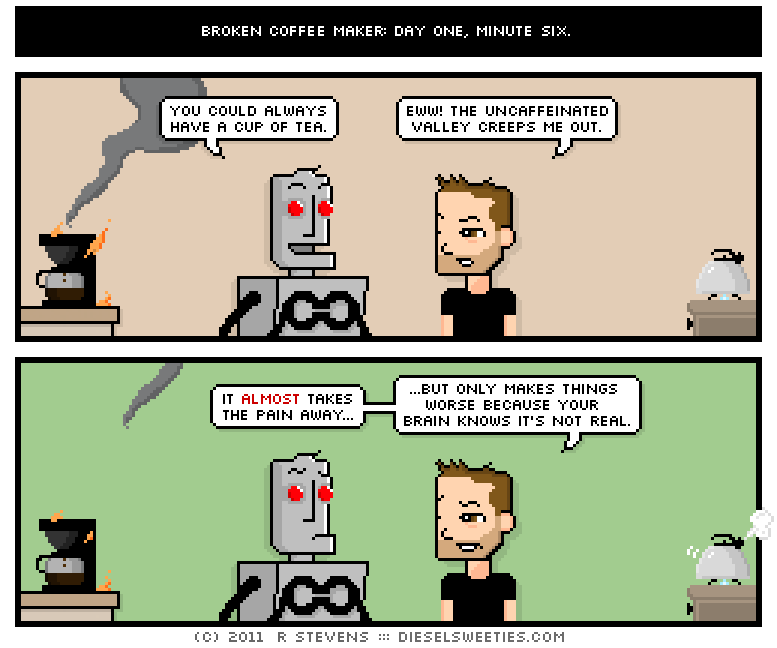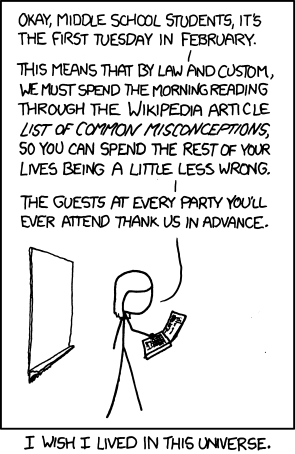Back when I was your age…
art, books, education, everyday glory, food for thought, games, geekery, history, music, news and info, office antics, science and technology, stage plays and theatre, travel, Whiskey Tango Foxtrot...?! January 5th, 2011Wednesday – 05 January 2011
It’s midweek, which means that it’s Comics Wednesday! Unfortunately, no word has been given on if/when “Sushi Wednesday” will be reincorporated into the mix. I guess time will tell.
Last night was D&D 3.5 night with
Today, I got to work only to discover that I had left my ID badge at home.
*grblsnrkx*
I have a temp badge. Yay. Although, I really shouldn’t gripe too much… it does what I need it to. Mostly.
Chew on This: Food for Thought
Publisher Tinkers with Twain
A new edition of “Adventures of Huckleberry Finn” is missing something.
Throughout the book — 219 times in all — the word “nigger” is replaced by “slave,” a substitution that was made by NewSouth Books, a publisher based in Alabama, which plans to release the edition in February.
Alan Gribben, a professor of English at Auburn University at Montgomery, approached the publisher with the idea in July. Mr. Gribben said Tuesday that he had been teaching Mark Twain for decades and always hesitated before reading aloud the common racial epithet, which is used liberally in the book, a reflection of social attitudes in the mid-19th century.
I read this article before heading to work this morning. When I got to the office, angstd messaged me to ask if I had seen it and what I thought about it…
I first read Huck Finn when I was in 8th Grade. I remember having a little bit of difficulty with it, not because of the content or offensive language, but from a few of the slang used. Aside from that, it was “just a book.” The fact that it dealt with social issues – especially slavery – wasn’t a big concern of mine, at the time. (Come on… I was 13 and it was reading for school.) I do remember thinking that it was a good book, however.
I’m not on board with Professor Gribben’s argument. I understand translating books from one language to another, but this was written in English – granted, some word structures are a bit dated, but English, nonetheless – and as a classic work of American fiction, I say leave it. Mr. Twain wrote it in a particular manner and I think that it should remain in that form. “Nigger” has a… colorful… history, but it is part of the American lexicon and, more importantly, it was part of the daily speech of many in the 19th Century. Changing the word to “slave” changes the dynamic of the language. I’ll concede that both words were used to denigrate the people about whom they were used, but one has a history of being used more harshly and cruelly. (Three guesses which it was.)
I was pleased to note that the article included a counterpoint:
“I’m not offended by anything in ‘Huck Finn,’ ” said Elizabeth Absher, an English teacher at South Mountain High School in Arizona. “I am a big fan of Mark Twain, and I hear a lot worse in the hallway in front of my class.”
Ms. Absher teaches Twain short stories and makes “Huck Finn” available but does not teach it because it is too long — not because of the language.
“I think authors’ language should be left alone,” she said. “If it’s too offensive, it doesn’t belong in school, but if it expresses the way people felt about race or slavery in the context of their time, that’s something I’d talk about in teaching it.”
Agreed. Were some of the issues that came along with and out of slavery offensive? You bet they were. But I don’t see them as things to be swept under the rug or turned away from. If we do that, we forget about a powerful and divisive part of our history.
I’m sorry that Professor Gribben has a hard time with a few words. But, that’s all they are: Words. They can be used destructively, but we can learn many things – from who we were and where we’ve come from to what we have achieved and where we are going – from even the most harsh of words.
Perhaps the professor should take some time to read Nigger: The Strange Career of a Troublesome Word, by Randall Kennedy. The book takes the word and attempts to present ways to diffuse its volatile nature and history.
Maybe that would help.
Stray Toasters
- Escaped from Belarus, Actors Raise Voices
- 8 Superhero Movies That Broke the Mold (Please Copy Them!)
- By way of my coworker, Corey: Detroit in ruins: The photographs of Yves Marchand and Romain Meffre

- Swear Freely In Pennsylvania: It’s Your #$%^&*^ Constitutional Right
- I’m not a big country music fan, but I do like Darius Rucker… and Hootie and the Blowfish (much to my friend, Peggy’s, chagrin). I caught a performance of this song on Palladia the other night. I was amused and entertained by it:
- “Whoops! #1”
- Could the days of the British “pint” be numbered?

- A Most Successful Self-Experiment: Over 18 Months Soap and Shampoo Free
- “Whoops! #2”
Namaste.
Leave a Reply
You must be logged in to post a comment.
